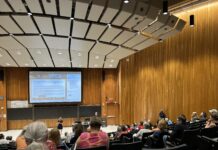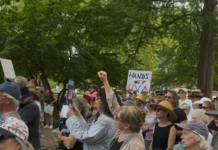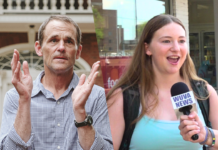On Wednesday afternoon, Evelyn Alsultany, a professor of American culture from the University of Michigan, gave a talk on the portrayal of Arabs and Muslims in the Media post 9/11.
Alsultany described the issue of increasing hate crimes and discrimination against Arabs and Muslims in America, which grew 1600% following 9/11.

The talk came at a timely occasion as just last week, a UC Berkeley student was escorted off of a flight after a fellow passenger heard him speaking Arabic over the phone. He had been speaking to his uncle about attending a speech by the UN Secretary General.
Alsultany spoke about how pre-9/11, there was an explicit portrayal of Arabs and Muslims as being evil, animalistic and aggressive in American media. She exemplified this point by playing Jackie Salloum’s Planet of the Arabs at the beginning of the event.
The paradox she described lay in the fact that hate crimes have been on the rise, even though post-9/11 media portrayals of Muslims have been rather positive. Alsultany illustrated this concept using clips from popular TV shows such as 24.
She used the term “Simplified Complex Representations,” which describes the common ways Arabs and Muslims are portrayed that include the patriotic American and the unjust victim of hate crimes. Nonetheless, she argues this is not necessarily a huge improvement from the pre-9/11 portrayals.
“It is an improvement from past, but I also note that the patriotic Arab-Muslim American is based on a very narrow view of patriotism,” Alsultany said, acknowledging that this really only touches the surface of a wider problem.
This change in media portrayal has been due to the fact that America has shifted away from the obvious explicit war propaganda it once used to stream, and now is looking to portray itself as the benevolent, enlightened country that has reached a post-race era.
However, as Alsultany argues, Donald Trump and Ben Carson are just a couple of examples of how Islamophobia remains a problem to be tackled in America.
She also points out that the image of the oppressed Muslim woman has been twisted in a way that leverages western imperialism.
“The horrifying stories create a monolithic image of Islam that the government uses to justify their actions towards [the Middle East],” she argued.
However, Alsultany seemed to claim that America failed to accept the fact that they are partially responsible for the growth of fundamentalism, and went further to say that the U.S. is partially the cause of 9/11, which seemed a controversial statement presented with no empirical evidence.
She concluded with the remarks that although the new media portrayal was an improvement, there was still much to be done to arrive in the post-race state we so wish to be in. Nonetheless, Alsultany didn’t seem to suggest any potentially constructive ways to resolve the situation, which left the talk at a somewhat cliff-hanger.
Alsutany has written two books on the topic, Arabs and Muslims in the Media: Race and Representation after 9/11 and Between the Middle East and the Americas: The Cultural Politics of Diaspora.
















